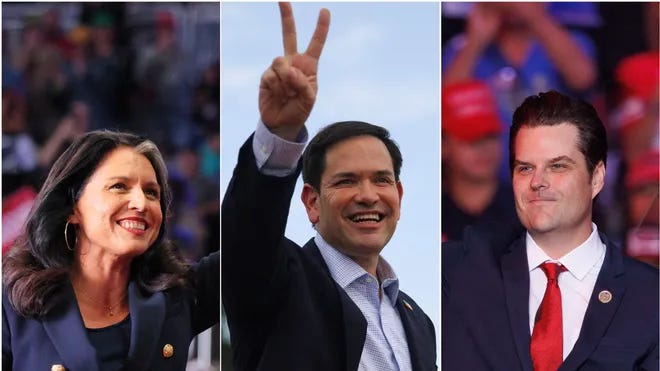Trump's Team of Loyalists
The president-elect is interested in only one thing: ensuring his top lieutenants are loyal to him and him alone. He wants to control government. All of it. And his loyalist will make sure he succeeds
Abraham Lincoln famously appointed a cabinet filled with his political opponents—including those who ran against him for president. This “Team of Rivals” as Doris Kearns Goodwin memorably called it, succeeded in ensuring that the Union remained in tact even after the nation’s bloody civil war. Other presidents would follow Lincoln’s example. Barack Obama, for example, appointed his own team of rivals, making his Democratic primary opponent (Hillary Clinton) his secretary of state, keeping his predecessor’s Republican secretary of defense (Bob Gates), and appointing a close confidant (Jim Jones) of his presidential election opponent national security adviser.
Donald Trump doesn’t believe in making nice with his rivals. He believes in loyalty. And he is surrounding himself with cabinet and other senior appointments who share one characteristic: unquestionable loyalty to him, and him alone.
Trump’s Team of Loyalists has shocked Washington. But no one should have been surprised. In his first term in office, Trump learned the cost of appointing people who disagreed with him and would use the levers of power their positions granted to obstruct his will. He spent four years preparing for the moment when he could return to the Oval Office. But this time, he would remove all the guardrails that had kept him in line the last time he was president. Now, Trump knows what he wants and he is determined to get it—all of it.
His determination to control government is characteristic of authoritarians and strongmen, which I and so many others warned about during the presidential campaign. There is nothing surprising about appointments to top posts that are designed to give him that control and to turn the government into an instrument of his will.
What is perhaps surprising is that Trump has installed people in the most critical positions who lack any expertise or even close understanding of the departments they will lead or roles they are meant to play. It started off ok, when Trump indicated that he would appoint Florida Senator Marco Rubio as secretary of state and Florida Congressman Michael Waltz as national security adviser. Rubio has served on the Senate Foreign Relations and Intelligence Committees for years, and has developed a grounded expertise in foreign affairs. Waltz is a Green Beret and 26-year Army veteran who served in combat in Afghanistan and elsewhere and also worked in the Pentagon and White House before entering Congress in 2018. Both are conventional picks for major positions—though both also demonstrated the necessary unswerving loyalty to Trump during the campaign.
But that is where expertise and convention ended. Within the spate of just 24 hours, Trump announced he would appoint Fox News personality Pete Hegseth Secretary of Defense, former Democratic Congresswoman Tulsi Gabbard Director of National Intelligence, and Florida Congressman Matt Gaetz as Attorney General. Each choice proved more stunning than the next. None of these appointees had the requisite experience or knowledge of the positions for which they were selected. But they had this in common: everyone is unswervingly loyal and will do whatever it takes to implement the president’s wishes.
It is the mark of strongmen to seize control of the judiciary, the military, the intelligence services, and the media. Gaetz, Hegsweth, and Gabbard are Trump’s chosen instrument for doing that for the first three of this critical government functions. Trump’s promise to go after the mainstream media by trying to take away broadcast licenses and suing them for promulgating “fake news,” while elevating the unfiltered social media channels of his own “Truth Social” and Elon Musk’s “X,” are aimed to curtail the reach of a free press.
While Washington and political circles are aflutter and many hope the US Senate will do its job and reject these unqualified nominees, Trump is determined to have his way. Even before announcing any of his appointments he insisted the Senate allow him to make recess appointments, which though temporary, are not subject to the Senate’s advice and consent. All three men running to be the new Senate Majority leader, including the eventual winner of the secret ballot, John Thune, pledged they would support such appointments if necessary. That very possibility, and Trump’s stated desire to use the mechanism, makes it all the more likely that at least 50 Republican Senators will vote to confirm his nominees. Crossing Trump is never easy to contemplate for Republican politicians, least of all early on and after his stunning victory.
In the unlikely event the Senate Republicans show some spine—and vote down Trump’s nominees and refuse to adjourn to allow Trump to make recess appointments—that likely won’t make much of a difference. His nominees are hardly the only loyal and unqualified leaders he could chose to appoint, challenging the Senate to keep voting them down. He could also simply defy the Senate by appointing senior leaders as White House advisers who are not subject to Senate confirmation. For example, Trump has announced that North Dakota Governor Doug Burgum will not only be secretary of the interior (in charge of oil and gas production permitting) but also the new National Energy Czar—a position that does not require Senate confirmation.
No matter what the Senate does or does not do, Trump will ensure that the White House is the locus of power over all departments at all times. He won’t brook dissent or independence from anyone. He wants and will insist on having complete control. And more likely than not, no one will be able to stand in his way and thwart his determination to succeed.



